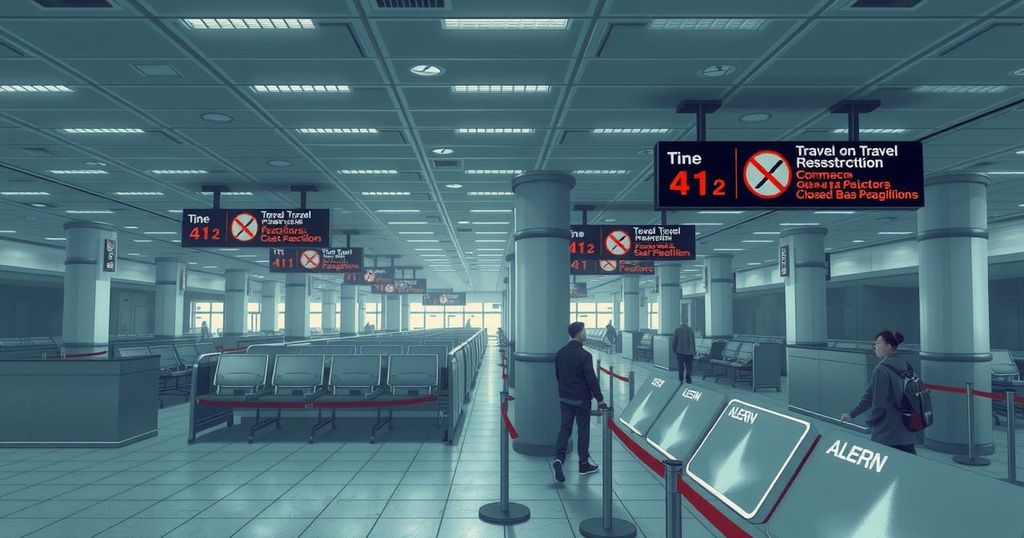Trump Revives Travel Ban, Creating Major Disruptions in U.S. and Abroad

US President Donald Trump reinstates a sweeping travel ban affecting citizens from over a dozen countries, raising fears of international isolation and chaos in the travel industry. The ban, effective June 8, 2025, blocks entry from countries including Iran, Libya, and Venezuela. Immediate impacts are feared for airlines, hotels, and educational institutions, alongside potential diplomatic repercussions. The policy prompts discussions of legal challenges and brings human stories into focus, emphasizing the emotional toll on travelers.
In a striking revival of one of his most contentious policies, US President Donald Trump has reinstated an expansive travel ban that affects numerous countries and creates a significant stir in the travel industry. Announced on June 5, 2025, the new restrictions create an even larger barrier to international mobility than seen previously, with implications reaching far beyond the immediate scope of air travel. The ban impacts nations including Cuba, Burma, and Iran, raising concerns over its wide-ranging effects.
The travel ban will be effective starting at 12:01 a.m. Monday, and it prohibits entry from 13 countries entirely while imposing new restrictions on travelers from eight others. Relying heavily on the narrative of national security, this policy rekindles fears of legal confusion and international isolation. Through this announcement, the President aims to deter citizens from nations that have close cultural and educational ties to the US, but this trigger for the new bans remains unclear and has raised eyebrows globally.
Countries barred from entry include not only Afghanistan and Syria, but also a few: Libya, Somalia, Yemen, and Sudan among others. What’s particularly alarming for travelers is the added layers of scrutiny for citizens coming from Burundi, Cuba, and Venezuela. Such measures are poised to disrupt significant travel, affecting families, students, and business dealings alike, fostering an atmosphere of uncertainty.
Airports, still reeling from memories of the 2017 travel ban, are preparing for chaos. Carriers are scrambling to deal with a likely surge in rebooking requests, and immigration officers are bracing for confusion as the implementation date approaches. Rebooking flights and managing last-minute cancellations might become the norm as travelers scramble to comply with the new restrictions, heightening anxiety for international guests.
As this travel ban reshapes the landscape of the U.S. tourism sector, it threatens to hit the hospitality industry particularly hard. Hotels and travel advisors worried about revenue and occupancy now face a crisis as many countries send fewer visitors to the US, especially in vibrant, culturally diverse cities. The looming cancellations and disrupted travel plans are already sending shockwaves through the economy.
International reactions could dampen relations between the US and the affected nations. Countries heavily impacted may retaliate with their own restrictions for American travelers, potentially leading to a tit-for-tat situation that complicates diplomatic ties. Already, foreign ministries are preparing to respond, signaling a need for careful consideration as the broader implications take shape in international arenas.
As the legal landscape shifts, observers expect a wave of challenges against this reinstated policy. Civil rights groups are poised to mobilize, reminiscent of the legal battles experienced during Trump’s earlier term. The previous versions of the travel ban faced extensive scrutiny, and though the Supreme Court upheld one, the legal questions surrounding executive authority remain pressing as political winds shift.
Travel advisors, already weathered from the pandemic, find themselves in a position to help clients navigate this new minefield of travel. They must quickly alter booking systems and notify clients of sudden regulations while they manage heightened emotional challenges of clients. The urgency for solutions only increases as time goes on.
Ultimately, the impact of this travel ban stretches beyond statistics and headlines—it’s about real lives affected by bureaucratic decisions. From students unable to complete their studies to families separated across borders, the ban’s human toll is profound. For an era emphasizing connection, this policy creates division when global collaboration is more necessary than ever.
This reinstated ban is not just an American issue; it reverberates globally, jeopardizing years of progress towards making travel more open and inclusive. With this uncertainty ahead, the travel industry is faced with a wake-up call, urging a rethink on crisis responses and the renegotiation of international collaborations. The choices made today will dictate tomorrow’s pathways in travel and tourism.
The reinstatement of the travel ban by President Trump marks a significant escalation in U.S. immigration policy, affecting a broad array of countries and shaking the travel industry to its core. As airports, airlines, and universities brace themselves for the consequences, the implications extend beyond logistical concerns to include potential diplomatic fallout and challenges in reintegrating international students and business travelers. The human impact of this policy cannot be overlooked, highlighting the deeply personal stakes in a landscape that is increasingly marked by division. The future of global travel hangs in the balance, emphasizing the need for unity over division.
Original Source: www.travelandtourworld.com






